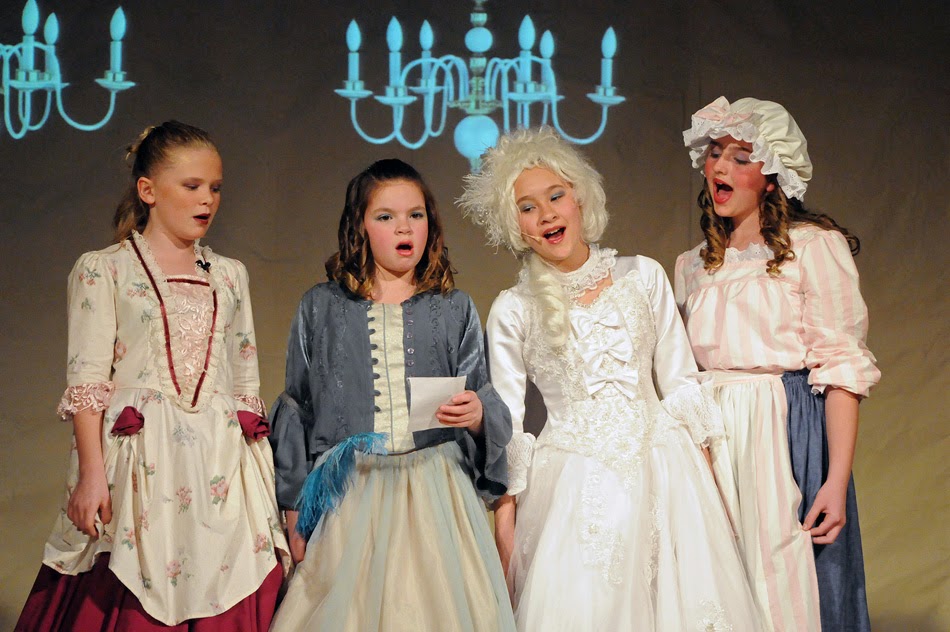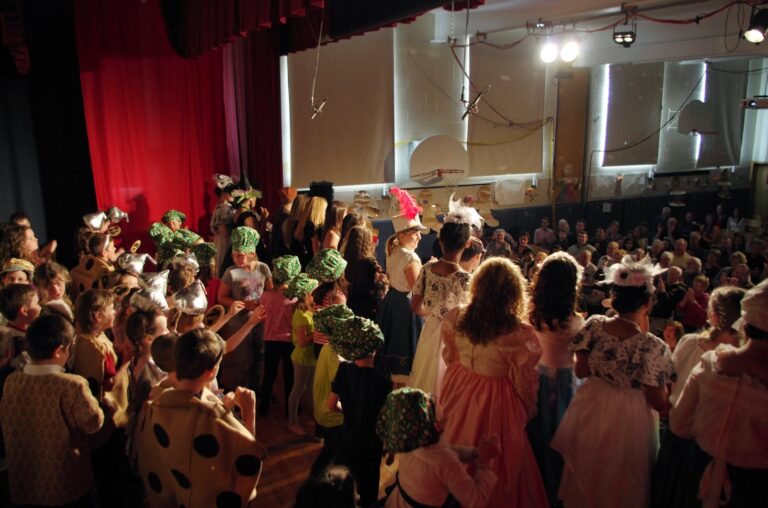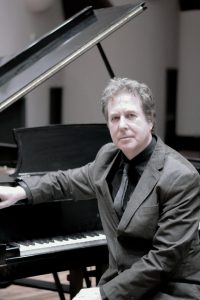An Interview With Teacher Dawn Martens
This year marks the 20th Anniversary of the Buchanan Park Opera Club. I interviewed the school’s music teacher and opera club founder, Dawn Martens, in her classroom which is crowded with racks of costumes and piles of props. In the interest of disclosure, I was the Maestro and Chorus Master for 13 of those twenty years.
 |
| Letter duet |
GHM: How did the Buchanan Park Opera Club get started?
DM: I decided to take the kids (a class of Grade Fives) to see a dress rehearsal of La Boheme. Afterwards the kids asked if we could put on our own opera. John Fanning was singing in the production and he came to the school to talk to the children and it took off from there. Because we had done La Boheme, the next year the opera company tried something called the Magic Flute Project in which three schools would produce a Magic Flute in co-operation with Opera Hamilton. Since then we’ve done an opera every year.
GHM: How do you choose which opera to do?
DM: We choose one from what Opera Hamilton does that season and they only do two operas a year. When they did Faust, we couldn’t because there were too many plot and character elements that couldn’t be played down in a child-like way. That year we did a Popularia, a program of opera excerpts, instead.
GHM: What did you know about opera?
DM: My grandfather had a beautiful baritone voice and sang in amateur opera productions in Ottawa, so I had some inkling of what opera was about. My first experience with a full- opera performance was not a positive one. I was in Moscow (on a university trip) and went to the opera there. I was exhausted with jet lag and it wasn’t a very good opera. There were no surtitles or anything and I remember sitting there wondering if the heroine was ever going to die. Later, at my parent’s suggestion, I went to a Popera concert at Hamilton Place and heard Claude Corbeil sing the Catalogue Aria from Don Giovanni and it was a very emotional performance and I was drawn into it. So I was attracted to opera, not by a full performance, but by an excerpt. Later I saw Jason Howard in the Marriage of Figaro and it’s just continued from then on.
 |
| Dawn Martens and a little witch |
GHM: What’s the most important thing you’ve learned about doing theatricals with children.
DM: It is important to have patience, in that it’s a long, unfolding process. We start in October and aren’t ready to go until April. To have a good production takes that long. I think you have to have the mind-set that it is like a train that’s running and you can’t stop it but it’ll arrive in the end. You can’t get caught up in the details or be freaked out because it’s such a big thing. It’s just knowing that they will learn their lines and everything will work out. So it’s patience and planning. That’s a huge thing working with kids.
GHM: How many adults and former students will come back to help in this production.
DM: For adult assistance, I have a group of about 60 who help out every year. Middle School Mentors are kids who’ve just moved on and there is about 10 of them. High School Helpers, there are about 25 of them so it’s a big team. We have a staff of 14 who help and we have a relationship with Mohawk College and their make-up students come and help too.
 |
| Curtain call. |
GHM: What do you think kids take away from it at the end of Grade 6. If they’ve stayed a this school they’ve seen operas twice in Kindergarten and will have played some role in six more after that.
DM: I think they take away innate knowledge of the operatic world that other children don’t have. You can ask them who wrote this piece, or what opera is this character from and they can tell you. They learn audience skills. They are used to sitting and listening to music. These days that’s unusual children who are not in audience situations. In term of overall learning they learn to co-operate and work in a group to produce something that is presented live. Everything seems so instantaneous to kids from television and other media. It is something less to actually work as a group and be able to say they’ve done it. There’s a group of children, not children any more, who get together and watch the DVD of the show they did in Grade Five or Six to be reminded that they were part of something special. Plus, if a child get’s a lead, a child who’s in need of reassurance, that child can take away that for one night in their life they were a star. And they will have pictures and a DVD record that they were an important part of that production.
GHM: Have you discovered any resources that might help someone considering putting on some kind of show?
DM: In terms of knowledge about this stuff there’s lots of web sites you can access. San Francisco Opera and the Canadian Opera Company have educational resources you can access. In terms of theatrical productions, I urge people to go to their local theatre companies. We’ve hooked up with Theater Ancaster and Theatre Aquarius. They are very generous to non-profit groups like ours. It’s important to find out what’s available locally.
GHM: How do you pay for materials and incidentals.
DM: We have two ways. First, we do fund raising. We have a benefit concert in March. We do things like Pita Lunches. Then we also have sponsors who pay for advertisements in our print program that mimics a real opera company program. These are monies that got to us. Any money we make during the opera goes to Children’s Leukemia Research at Chedoke/McMaster. We’ve donated $55,000 over the nineteen years we’ve been doing it.
GHM: Do you think involving boys in the production helps to correct for the gender imbalance in participation in arts activities.
DM: Yes, and it depends on what opera we’re doing to see how involved the boys get. I’ve done some operas that have a military aspect to them so I’ve been able to get in someone who’s involved in stage fighting. We’ve doing Carmen this year and it’s a great opera for the guys who get to be soldiers or smugglers. It think it does allow them to participate in a way that just standing, singing in the chorus wouldn’t. We’re doing training with a fantastic set of rifles. It really draws them in, then I tell them, “If you’re going to be a soldier or smuggler you have to sing in the chorus”, and they sing in the chorus.
GHM: Have you seen any evidence that encourages people to be involved in arts later in their lives.
DM: Yes. I have because this year, because it’s twenty years, I’ve been researching what has happened to the kids who have gone on. Of course, I’m biased, I’m looking for the kids that are still involved. I’ve taught kids who’ve gone on to be music teachers, been in other theatrical production even if only in high school. I think the familiarity with it helps them. Even though they step away from it in Middle School. (It’s a difficult age, I get them just before that.) They boys especially step away from the singing. I think it’s a seed you’ve planted that needs time to grow. Certainly I’ve had kids that tell me how deeply it’s affected them or how they remember this one thing that’s stuck with them.
GHM: Have you encountered any criticism or unforeseen challenges along the way.
DM: All the time. The most stressful years were when we had labour action in the school and I didn’t know if we were going to go ahead with the production or not. To be preparing for something when you don’t know whether it will fly. And I’d be doing all the preparation, all the work, in the classroom because I couldn’t ask any of the teachers to help extra-curricularly. As for criticism, the more you’re out there, the more is written about you, the more you’re visible. There will be criticism and you have to develop a thick skin. There’s been a remarkable lack of criticism consider the subject matter of the operas. It’s been all about keeping it on the children’s level and not delving into things to which an opera alludes. I might say too, that the apathy toward opera comes from the parents, not the kids. They are still young and not yet into the Middle School “critiquing” mode. So they’re quite open at this age. I’ve had kids say, “My mom doesn’t like opera”, but I don’t have the kids say that. So, you’ve got to get the parents to see a production so they can see that opera is not a high falutin’ thing. It’s accessible to everybody.
GHM: There must have been amusing things that have happened during performances.
DM: It was during an Aida. Brian Deedrick, the former artistic director of Edmonton Opera saw this and told me. There was a line of soldiers backstage ready to go one and, as they started to climb the stairs they fell, the entire army, like a line of dominos.
Kids are so funny to work with. My Escamillo just asked if he could sing because he’s losing three teeth. I said, sure as long as they aren’t the front ones!
There’s always something funny going on. When you’ve got 200 children all costumed and ready to go on you’re always the potential for disaster. We once had an angel throw up right down-stage in Don Giovanni. But the show went on. I didn’t even realize it had happened until it was over. Perhaps the funniest was when we had Grade One Ladybugs dancing in the Merry Widow and you, our conductor, had to go up on stage and break up a fight between two boys. I have it on video!
GHM: Has it gotten easier?
There have been lots of changes. There’s a certain predictability and there’s not a feeling any more that I have to prove myself because it’s an established program. The flip side of that is that there’s a standard to be lived up to. It’s easier when you redo a show you’ve done before. And it’s co-curricular. I couldn’t have taught music for 20 years doing the same thing year after year. Every year it’s fresh. A new group of kids. It’s different.
May 1-3, Times TBA.





